- Home
- Chris Petit
The Passenger Page 6
The Passenger Read online
Page 6
‘American?’ Greene asked.
‘Kind of,’ said Angleton.
Greene smoked Sweet Aftons. Angleton obliged with a light, cupping his hands to protect the flame. Mrs B, the trolley woman, gave a high-pitched laugh and Angleton knew he was blushing and Greene had seen. Greene grunted thanks and wandered off, mug in hand, before turning to ask, ‘What do you mean, kind of?’
Angleton told him he had been born in Idaho, lived in Italy and gone to school in England. Greene lost interest. ‘Poor you,’ he said, leaving Angleton, who had been hoping for more, crushed.
Greene’s verdict on Americans: insufficient geography.
In Memoriam
Charlotte’s return was marked by her further withdrawal. Denial took the form of refusing to hope or even to discuss Nick beyond insisting he would have got in touch. Her silence was thrown back at him and his grew in the shadow of Nick’s greater silence.
Collard, driven from the room, sat useless in the lounge then in the bar where he was surprised to see Evelyn at his usual table.
‘Had a bloody row with the other hotel. Stack’s in Germany and I want to go home. They won’t let the bereaved view the bodies, did you know? The psychiatrists decided it would be too distressing.’
Collard thought of the bodies he’d seen.
‘How will they identify them?’
Evelyn shrugged.
The ice rink had become a building people avoided. An area had been put aside for the body parts they hadn’t been able to match up.
‘The ones they had to scrape up with a spade they put in special boxes,’ Evelyn said. ‘The bereaved seemed oddly consoled by the idea of a presentable corpse. My abiding memories of this trip will be the stink of aviation fuel and formalin. The only thing that gets rid of the smell is whisky. Fancy one?’
Collard had nothing else to do.
‘I spoke to one man who had privately managed to beat the embargo on viewing the dead to see his daughter, only to be manhandled out of the rink by the police afterwards.’
Evelyn thought such aggression would become symptomatic of the investigation.
‘Once it becomes clear things might drag on for years, hostility will become a feature of the authorities’ behaviour.’
‘Years!’ Collard said. ‘You said they know who did it.’
‘Knowing’s not proving.’ Evelyn reached for another cigarette and knocked over his drink. He made no effort to retrieve it, staring at it listlessly. Collard got a cloth from behind the bar and mopped it up.
‘Are you all right?’
‘Never better.’
‘You look out of sorts.’
‘Nothing that a pipe of opium and a couple of Manila whores wouldn’t cure. The dead will not be answered. That bomb changed everything. It was a defining moment, like the assassination of the archduke in Sarajevo in 1914, or the liberation of Dachau, or the dropping of the atom bomb. The tectonic plates of history shifted, as they did here.’
It would be a symptom of this new age that people and things and witnesses would be paraded before the world, would be told this was how it happened, and guilty men and culpable countries would be served up for its hostile delectation, but truth would be the first victim of the explosion.
‘You may think you know the answer, but you don’t,’ Evelyn said. ‘Mark my words.’
By the time the Prime Minister and her retinue attended the memorial service the public mask of grief was in place. She listened to the intonations with a grave expression and a cocked ear, reminiscent of the hard of hearing. Her husband had replaced his usual grin. The Prime Minister’s immediate circle was all men, clearly in thrall. Before the service, Evelyn had said it was a pretty good turnout in terms of seniority. Collard encountered him outside, almost unrecognizable in a dark suit and tie, his unruly hair slicked down. Stack was back at his side, smart in a black suit. Charlotte hung back, reluctant to be introduced. Collard wanted nothing more than to sit down with the three of them and discuss the absurdity of Sheehan’s insinuations.
Charlotte and Collard sat among the mourners. The American Ambassador read of Christ’s raising Lazarus from the dead. Collard felt like an impostor. He spent the service alternating between thinking about Nick, wherever he might be, offering clumsy prayers for his safe return, and discomfort at attending what could have been his own memorial service.
The mysterious Americans from the first wave of the investigation were conspicuous by their absence. Given the number of senior officials, there was a heavy security presence: bulky men, awkward in suits, distinguished by their faraway look as they scanned the crowd.
It was a show of solidarity the British were very good at, Evelyn said afterwards.
‘Turn up, hijack the show and make sure no one asks tricky questions.’
Charlotte looked away, angered by his levity.
They were standing outside after the service. The mourners were mainly silent. Some wept. Television commentators intoned in their most serious voices. Evelyn lit up a Silk Cut.
At the memorial tea party, senior civil servants and clergy with suitably grave expressions on their plump, well-barbered faces snaffled the sandwiches. Charlotte and Collard talked to the bereaved. Collard sensed anger replacing the initial shock. The airline was being blamed for lack of security and dragging its heels. Collard overheard someone say a farmer had found a suitcase full of drugs. The authorities denied its existence. How long before Sheehan fed Nick into the rumour mill? Collard wondered. How long before Evelyn and Stack turned on him, sniffing for Nick’s story?
He went out for some air.
He thought of what Evelyn had said about the dead, no closer to being properly represented, and of the core of secret activity evident from the start, whether purposeful or panic he had no idea. Something had been going on, a separate investigation – or several – that had nothing to do with the official one. Even now Collard fancied he could recognize harder, grimmer expressions on select faces, reflecting more than tragedy; a failure of security perhaps. That was what they were afraid of. Evelyn was right. No one would satisfy the dead or the grief of the bereaved: so many brutally interrupted lives and the cruel agony of their dispersal.
For the dignitaries, turning up was a matter of show, a mild inconvenience, best represented by the Minister of Transport, who had refused to cancel his Caribbean holiday after the crash. The investigation would become about accumulation. Any proper explanation would be lost in the mess. It was happening, in ways he never could have imagined, with Nick.
A Japanese photographer stuck a camera in his face and took his picture. Collard was aware of Sheehan watching then turning and walking away.
Back inside, he found himself steered into a line of mourners being admitted to the Prime Minister’s circle. When they shook hands she seemed to look deep into his eyes while intoning, ‘Our deepest sympathies are with you on this saddest of days.’
Collard inspected her for insincerity and found none, even when he saw her eyes were blank and glazed and not focused on him at all.
‘Prime Minister,’ he said, not knowing how he would continue: either by saying the dead were being failed or his son was maligned by mysterious parties as sinister as the perpetrators of the outrage. Before he got the chance he was taken firmly by the arm and moved on.
Collard saw the security men sizing him up. He wondered if he looked dangerous or about to lose control. He had seen panic flicker in the Prime Minister’s eyes. He thought of all the anger that had coursed through him since the crash. It had returned with the Prime Minister’s condolences and he understood how the aggrieved might select her as an outlet for their frustrations. To his shame, he had wanted to hit her because he sensed when it came to answers she was as powerless as he.
Separation
At Charlotte’s insistence they walked up to the cairn.
She said, ‘We need to talk.’
Her tone was the first sign her preoccupation was about more than Nick. C
ollard knew, in the stretched seconds before she told him, she would be leaving.
Everything made belated sense, from her physical awkwardness to her decision to go off, which he had misread as part of his failure to cope. She was half-gone already. Part of him felt inured, cauterized by the events of the last days. However angry he might feel – which was different from being hurt – he resolved to be reasonable. Part of him wondered, absurdly, how they would spend the rest of the day.
He felt bound to say he didn’t see how she could walk out of his life like that.
He asked the usual questions, knowing what the answers would be. Yes, it was serious. No, she hadn’t been looking for an affair. He said he didn’t want to know about the man or who he was. ‘Why are you telling me now?’
She didn’t want her mourning to be overshadowed by a lie.
He wanted to yell Sheehan’s accusations at her, to show how much more complicated everything was than she believed.
‘Would you have told me anyway?’
There was no dignified way to conduct the conversation. Deep down, he had been expecting the worst since she went to New York. More than once he had resisted a pre-emptive strike with an affair of his own. He had resented her independence.
Down the hill he could see the red hire car; otherwise only other sign of life was a yellow dump truck making its way to the horizon. He couldn’t think of anything smart, understanding or vicious to say. He couldn’t decide whether Charlotte’s decision involved a moral courage or she was hiding behind Nick. The speed at which everything had unravelled alarmed him. He half-expected to see the debris of their marriage strewn across the landscape like the crash.
She said, ‘I’m going to walk back.’
He stepped away to avoid kissing her.
‘You’re wrong about Nick. You’ll have to tell him, you know.’
He remained after she had gone. The cairn they had built for Nick seemed pointless. She was wrong. There was no death to commemorate. He kicked the stones to pieces.
The Frame
Charlotte was gone when he got back to the hotel. Collard checked out although it meant paying for an extra night and he had nowhere to stay. The phone in the room rang before he could leave. He thought it would be Charlotte, stepping back, but it was Sheehan ordering him in.
‘I’m busy.’
‘It’s about your son.’
‘Have you found him?’
Collard held his breath. Sheehan’s answer was negative. He wanted to tell Sheehan to fuck off. He wanted to get away.
Sheehan was waiting in the small interview room they had used before. He lit a panatella, which stank. He insisted on going over Nick’s ticket arrangements.
‘Who paid for the ticket?’
‘I did.’
‘Bought it personally or wired the money?’
‘There was a pre-paid ticket I bought by credit card over the phone, waiting at the collection desk. Nick would have changed it when he rebooked.’
‘Why did he rebook?’
‘He said he was going to be late getting to Frankfurt.’
‘What was his reason?’
‘He didn’t say.’
‘You didn’t think to ask?’
‘He had already done it. I didn’t want to be a bore about it.’
‘He just told you he had changed the date. He didn’t talk about it first?’
‘He called and wanted to know if I could still travel with him.’
‘When was that?’
‘On the twelfth.’
‘None of this seemed odd?’
‘What is this about?’
‘Did you see him collect the ticket?’
Collard shook his head.
‘He cashed it in,’ said Sheehan.
Collard’s elation returned.
‘This is not necessarily good news.’ Collard saw then that Sheehan had brought him there to knock him down. ‘Your son wasn’t listed with the regular passengers because he was travelling as a courier. He was under the name of the company he was delivering for.’
Collard didn’t understand.
‘Your son cashed in his ticket so he came out ahead and arranged to deliver for the courier company.’
‘He could have asked me for the money.’ He stopped. ‘Don’t tell me he was on the plane after all.’
‘Not necessarily. How well do you know your son?’
Collard was haunted by the sarcasm of the question.
Did Nick take drugs? Sheehan wanted to know. Collard refused to defend Nick against such a speculative accusation.
Sheehan relented, saying as a parent he knew how painful it was to discuss this sort of thing. But a lot could happen in three months, to someone young and impressionable.
‘Of course, he was supposed to have been coming back with you, which would look less suspicious than a backpacking teenager.’
Collard protested. Sheehan ignored him and produced a garish postcard with a 3D picture that alternated between a nude and the Virgin Mary.
Collard slowly turned it over and saw their London address and Nick’s name. The message was typed and read: My dear friend Nick, I am sending you good wishes and hope we will see each other before maybe you get this, your very good friend Khaled.
The card had been stamped in Cyprus and franked on November 5, 1988.
‘How did you get this?’
‘From your house. Search warrant.’
It was a sign of how serious Sheehan was. Collard stared at the card and asked, ‘Do you know anyone who types postcards?’
‘Khaled is at the centre of our investigation.’
Everything until that moment had seemed like something Collard could argue Nick out of. Previously he had not let himself think that Sheehan had a case.
‘How did your son finance his trip?’
‘He worked weekends in a restaurant and I gave him a hand.’
‘Two thousand pounds’ worth of hand?’
‘I gave him a couple of hundred pounds twice, maybe five hundred altogether.’
Sheehan reached into his pocket and passed Collard a copy of Nick’s bank statement.
It showed several deposits, fewer withdrawals because Collard had persuaded Nick to take travellers’ cheques. Collard recognized his two payments of two hundred and fifty pounds. Up to August, deposits were small and frequent, reflecting Nick’s wages.
In November there had been a big jump, with over two thousand pounds paid in. In the first week of December there was another deposit for the same amount. There was no legitimate source for sums like that in such a short time.
The last deposit was for seventeen hundred pounds made on December 23, two days after the crash.
The same amount had been withdrawn the day Sheehan told Collard that Nick wasn’t on the passenger list.
The payments into the account had been drawn against cheques issued by a company named Bar-L Export from an account in Antigua. Nick’s withdrawal had been made at the BCCI branch in Sloane Street, meaning he had been in London and perhaps still was, hiding somewhere. Collard’s certainty returned.
‘What are you accusing him of?’
‘The bombers took advantage of dope smugglers. I’m sure you’ve heard about the suitcase full of heroin they found at the crash site.’
‘Are you saying my son and Khaled were smuggling drugs?’
‘I know how tough this is for you.’
‘I thought the drugs business was cash only. Since when did they sign cheques?’
‘When they want to launder money so your son can appear on a set of books, paid for some unperformed task.’
Nick had been in London and hadn’t got in touch, which meant he hadn’t wanted to, which gave credence to Sheehan’s theory. Collard found himself not wanting to know. It was the last thing he would have associated Nick with.
Bank statements didn’t lie. The latest withdrawal was proof that Nick was alive, not the kind Collard would have liked, but proof nonetheless. I
f that that was the price of Nick’s survival, so be it.
Collard wondered how he’d feel if Nick really had been involved with Khaled and used him as Sheehan insisted, giving the boy the bomb to carry. What if the old man’s warning had been Nick’s way of getting him off the flight? And who on earth was the old man anyway, given his apparent connection to his former school, of all places?
‘This is nonsense. You’re just looking to blame Nick. This is all speculation.’
‘Prove me wrong.’
He felt Sheehan’s power, testing as he went along, improvising like a skilled musician.
Summoning his last reserves, Collard said, ‘You are deliberately trying to undermine everything I believe about my son.’
‘Mr Collard, you are in denial.’
Something so quick and offhand about Sheehan’s response made it seem almost reckless, almost as though he needed Nick to be guilty.
‘Did your boy ever mention Quinn?’
‘Who’s Quinn?’
Sheehan produced a photograph of a busy café somewhere sunny that looked like it had been taken from a car across the street. Nick was sitting at a pavement table. He was wearing dark glasses and a loose shirt, and leaning back in his chair, his expression unreadable. Seated at the same table was an older man, very thin, with a wolfish face and a white crew cut. He didn’t look obviously American, though Collard was sure he was. Despite his casual clothes, the man had a hard professional air about him.
‘Is that Quinn?’
‘Do you recognize him?’
‘Of course not. Where was this taken?’ Collard was still thrown by the unexpected picture of Nick, looking mysterious and not the boy he remembered.
‘Cyprus. Among those dead on the flight were three American secret agents.’
‘Was Quinn one of them?’
‘He was the fourth member of the team. He didn’t fly.’
‘Where is he now?’
‘That’s what I’d like to know.’
‘What was he doing talking to Nick?’
‘Same answer as the last question. Did your son ever mention anyone called Barry?’

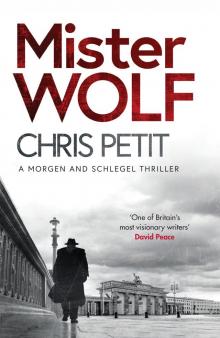 Mister Wolf
Mister Wolf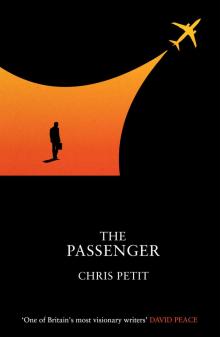 The Passenger
The Passenger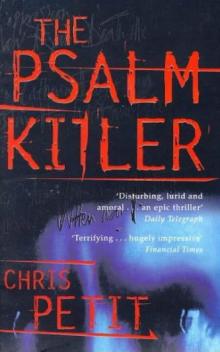 The Psalm Killer
The Psalm Killer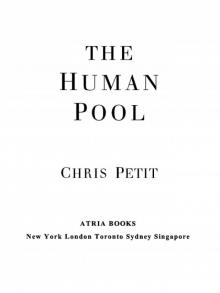 The Human Pool
The Human Pool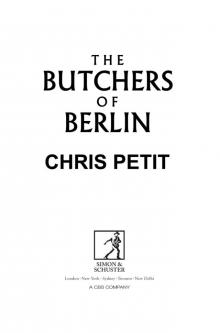 The Butchers of Berlin
The Butchers of Berlin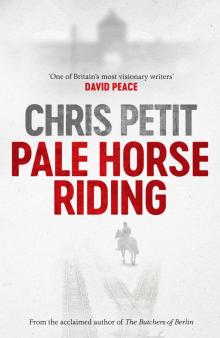 Pale Horse Riding
Pale Horse Riding